介词讲义--(田静)(1)
介词 初一升初二英语讲义
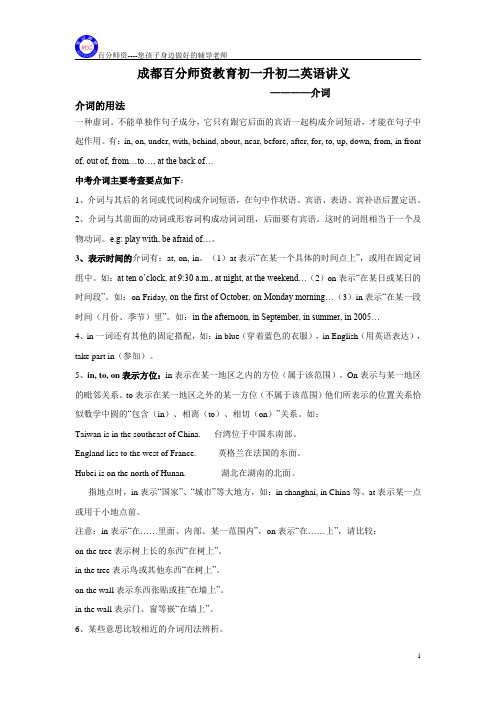
成都百分师资教育初一升初二英语讲义————介词介词的用法一种虚词。
不能单独作句子成分,它只有跟它后面的宾语一起构成介词短语,才能在句子中起作用。
有:in, on, under, with, behind, about, near, before, after, for, to, up, down, from, in front of, out of, from…to…, at the back of…中考介词主要考查要点如下:1、介词与其后的名词或代词构成介词短语,在句中作状语、宾语、表语、宾补语后置定语。
2、介词与其前面的动词或形容词构成动词词组,后面要有宾语。
这时的词组相当于一个及物动词。
e.g: play with, be afraid of…。
3、表示时间的介词有:at, on, in。
(1)at表示“在某一个具体的时间点上”,或用在固定词组中。
如:at ten o’clock, at 9:30 a.m., at night, at the weekend…(2)on表示“在某日或某日的时间段”。
如:on Friday, on the first of October, on Monday morning…(3)in表示“在某一段时间(月份、季节)里”。
如:in the afternoon, in September, in summer, in 2005…4、in一词还有其他的固定搭配,如:in blue(穿着蓝色的衣服),in English(用英语表达),take part in(参加)。
5、in, to, on表示方位:in表示在某一地区之内的方位(属于该范围)。
On表示与某一地区的毗邻关系。
to表示在某一地区之外的某一方位(不属于该范围)他们所表示的位置关系恰似数学中圆的“包含(in)、相离(to)、相切(on)”关系。
如:Taiwan is in the southeast of China. 台湾位于中国东南部。
语法介词专题讲解(1)

Miss Li is standing _a_m__o_n_g_ the students. 在三者或者三者以上之间
4. in front of 和 in the front of
The man is _i_n_f_r_o_n_t_o_f the car.
在……(外部的)前面
The girl is _in__th__e_f_ro_n__t _of the car.
(广西贺州市中考题)
A. from B. of C. by D. in
3.The basket is full___B______ apples.
(北京市中考题)
A. with B. of C. in D. by
4.Kate can't come.Let's ask wei Hua
instead___A___her. (上海市中考题)
8.忙于做某事 be busy _w_i_th__ sth.
9.为---做准备 be ready _fo_r_
10.装满
be full _o_f
11.对-----有好处 be good _fo_r_
12.对------感兴趣 be interested _in____
1.hear from
13. ring up
表示大于一天的时间如__月_,__季__节,__年__,_世__纪用等in
还有: in the morning, in the afternoon , in the evening
泛指 在早上/下午/晚上也用 in
in年in月in季节,有日就用on , 时刻怎
2)时间的前后 before, after 在……之前 在……之后
新概念2上册
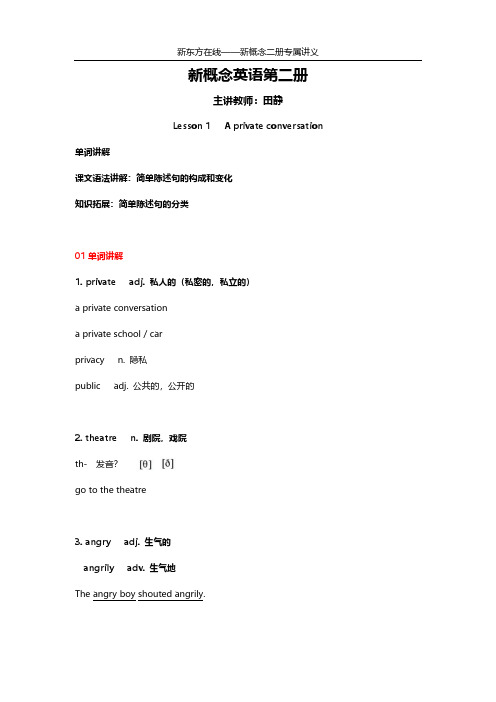
新概念英语第二册主讲教师:田静Lesson 1 A private conversation 单词讲解课文语法讲解:简单陈述句的构成和变化知识拓展:简单陈述句的分类01单词讲解1. private adj. 私人的(私密的,私立的)a private conversationa private school / carprivacy n. 隐私public adj. 公共的,公开的2. theatre n. 剧院,戏院th- 发音?go to the theatre3. angry adj. 生气的angrily adv. 生气地The angry boy shouted angrily.4. loudly adv. 大声地loud adj. 大声的5. rudely adv. 无礼地,粗鲁地rude adj. 无礼的,粗鲁的6. attention n. 注意·pay attention to sb. / sth.We pay attention to the new words. They did not pay any attention. ·May I have your attention, please? ·Attention, please.·attract / catch / draw one’s attention02课文语法讲解:简单陈述句的构成和变化1. 简单陈述句的构成——核心①名词+ 动词(n. + v. )主语+ 谓语例1:Birds fly.例2:We walk.②主语+ 谓语v. + ?例1:I have ? I have a seat.例2:The play was ? The play was interesting.2. 简单陈述句的构成——语序你吃苹果。
苹果吃你。
你苹果吃。
例1:The policeman arrested the thief.The thief arrested the policeman.3. 简单陈述句的变化例1:Boys talk.Boys were talking.Lovely boys were talking loudly.Yesterday after class lovely boys were talking loudly about the exam in the classroom.例2:I go.I went.I went to the theatre.Last week I went to the theatre.例3:I have a seat.I had a seat.I had a very good seat.例4:简单陈述句的变化——谓语动词的变化They were talking loudly. (时态)It was bought by my grandfather. (语态)I could not hear the actors. (情态+否定)I did not enjoy it. (时态+否定)(课文…)Last week I went to the theatre.I had a very good seat.The play was very interesting.I did not enjoy it.A young man and a young woman were sitting behind me. They were talking loudly.I got very angry.I could not hear the actors.I turned round.I looked at the man and the woman angrily.They did not pay any attention.In the end, I could not bear it.I turned round again.”I can’t hear a word !”I said angrily.”It’s none of your business,”the young man said rudely.“This is a private conversation !”练习:连词成句词:the film;I; enjoyed;yesterday句1:I enjoyed the film yesterday.句2:Yesterday I enjoyed the film.词:games; played; yesterday; in their room; the children; quietly 句:The children played games quietly in their room yesterday.03 知识拓展:A 简单陈述句的分类They meet. 主谓I love you. 主谓宾I tell you a secret. 主谓双宾I find you interesting. 主谓宾补You are beautiful. 主系表比较:They meet. 主谓vi. 不及物I love you. 主谓宾vt. 及物You are beautiful.主系表系动词·系动词:①be动词(单独出现)②get become turn go grow “变得”③look sound smell taste feel “看起来/听起来/闻起来/品尝起来/感觉起来…”例1:The play was very interesting.例2:They were talking loudly.例3:I got very angry.B 不规则变化的动词:go - went - gonehave - had - had - havingdo - did - donebe - was/were - beensit - sat - sat - sittingget - got - got/gotten - gettingpay - paid - paidsay - said - saidLesson 2 Breakfast or lunch? 单词讲解课文语法讲解:一般现在时,现在进行时,感叹句知识拓展:一般现在时vs. 现在进行时,it01单词讲解1. until prep. 直到until lunchtimeuntil nowuntil recentlyuntil the last moment2. outside adv. 外面insideupsideupside down3. ring v. (铃,电话等)响sing - sang - sungdrink - drank - drunkswim - swam - swumbegin - began - begun4. repeat v. 重复retellrewriterediscoverrebroadcast= Pardon? / I beg your pardon?02课文语法讲解:•现在进行时•一般现在时•感叹句时态①什么是时态?②如何体现?③一共多少种?1. 一般现在时:谓语v. = 原形/第三人称单数(do/does)例:I tell you a secret.He tells you a secret.Your friend tells you a secret.用法1:表示现在经常性习惯性的动作,例:We have the English class every day.I never get up early on Sundays.I sometimes stay in bed until lunchtime.He often gets up late.搭配频度副词:always, usually, frequently, often, sometimes, seldom , rarely , hardly , never…用法2:表示现在的状态,例:I am a teacher.It is one o’clock.用法3:表示永恒,例:The earth is round.The earth moves around the sun.Practice makes perfect.一般现在时变否定疑问2. 现在进行时:谓语v. = am/is/are +doing 用法1:表示现在正在进行的事,例:I am having breakfast now.J.K. Rowling is writing another book this year. 用法2:表示将来确定要发生的事,例:I am coming to see you.We are arriving at ....The old man is dying.现在进行时变否定疑问He is listening.He is not listening.Is he listening?What is he doing?(课文…)It was Sunday.I never get up early on Sundays.I sometimes stay in bed until lunchtime.Last Sunday I got up very late.I looked out of the window.It is a terrible day!What a terrible day it is!What a day it is!3. What a day! 感叹句:What + n./n.词组!例:This is a wonderful world. - What a wonderful world (this is)! It is a surprise. - What a surprise (it is)!What a pity!What a mess!:感叹句:①What + n./n.词组!②How + adj./adv. !例:How interesting!(课文…)'It's raining again.’'I'm coming to see you.’'But I'm still having breakfast,' I said.'What are you doing?' she asked.'I'm having breakfast,' I repeated.03 知识拓展:A 一般现在时vs. 现在进行时I am looking out of my window.I can see some children in the street.The children are playing (play) football.They always play (play) football in the street.They always play football in the street.Now a little boy is kicking (kick) the ball.Another boy is running (run) after him but he cannot catch him.B it:It was Sunday. / It’s one o’clock!It was dark outside. / It’s raining again.It was my aunt Lucy.Lesson 2 Breakfast or lunch?C 不规则变化的动词:think - thought - thoughtring - rang - rungcome - came - come - comingLesson 3 Please send me a card单词讲解课文语法讲解:一般过去时,主谓双宾知识拓展:一般过去时,主谓双宾01单词讲解1. send v. (sent , sent) 寄,送send a card/a message /a lettersend me a card = send a card to mesend sb. sth. = send sth. to sb.2. spoil v. (spoiled or spoilt) 使索然无味,损坏Postcards always spoil my holidays.damagedestroyruin3. public adj. 公共的public gardens / schools / opinionsn. 公众,大众The museum is open to the public on Sundays. private adj. 私人的L14. friendly adj. 友好的a friendly waiterHe is friendly to all of us.lovely lonely timely brotherly5. lend v. (lent , lent) 借给lend sb. sth. = lend sth. to sb.lend me a book = lend a book to meCan you lend me 200 dollars?lend v. (lent , lent) 借给lend 借出/ borrow 借入borrow sth. (from sb.)6. decision n. 决定It is my final decision.I made a big decision.decision n. 决定decide v. 决定decide to do sth.I decided to go abroad for further education.02课文语法讲解:一般过去时,主谓双宾1. 一般过去时形式:V.过去式(did)用法:Last summer I went to Italy.Mary and I talked (talk) about your book hours ago.They had (have) a meeting yesterday.Tom was (be) a student when he was ten years old.She had a boyfriend.Tom was a student.一般过去时变否定疑问You were happy.You were not happy.Were you happy?They had a meeting.They did not have a meeting.Did they have a meeting?(课文…)Postcards always spoil my holidays.Last summer I went to Italy.I visited museums and sat in public gardens.A friendly waiter taught me a few words of Italian. (teach sb sth = teach sth to sb) Then he lent me a book. (lend sb. sth. = lend sth. to sb.)I read a few lines, but I did not understand a word. (read - read - read; understand - understood - understood)Every day I thought about postcards. (think - thought - thought)My holidays passed quickly, but I did not send cards to my friends. (send sb. sth. = send sth. to sb.)I spent the whole day in my room, but I did not write a single card!03 知识拓展:一般过去时,主谓双宾A 一般过去时(中考真题)1. Paul and I __________ tennis yesterday. He did much better than I.A. playB. will playC. playedD. are playing答案:选C。
考研英语田静句句真研英语二

目录分析
《考研英语田静句句真研英语二》是针对考研英语二的备考书籍,通过对这本 书的目录进行分析,可以了解到这本书的内容构成和知识结构,对于考生来说 具有非常重要的指导意义。
在引言部分,本书介绍了考研英语二的考试形式、考试内容以及备考策略。同 时,也强调了语法和长难句在考研英语中的重要性,为后续的章节奠定了基础。
“翻译不仅仅是语言的转换,更是文化的交流和沟通。”(摘自翻译篇)
“词汇是语言的基石,没有足够的词汇量,就无法有效地进行语言交流。” (摘自词汇篇)
这些摘录不仅道出了语言学习的真谛,也指出了考研英语备考的关键所在。它 们鼓励考生在备考过程中注重实践和应用,而不仅仅是死记硬背。通过深入学 习和实践田静老师的理念和方法,考生可以在考研英语中取得更好的成绩。
读完这本书后,我深感其对于考研英语的指导意义。它不仅教会了我如何分析 句子、理解语法,更让我明白了如何将所学知识运用到实际的考试中。这本书 的实用性和系统性,无疑为我的考研之路提供了巨大的帮助。
我想说,《考研英语田静句句真研英语二》这本书不仅是一本备考的参考书, 更是一本可以伴随我走向成功的良师益友。对于那些正在准备考研英语的同学, 我强烈推荐大家阅读这本书,相信它会给大家带来意想不到的收获。
这一章提供了多套模拟试题,并附有详细的解析和答案,帮助考生检验自己的 备考成果。
系统性:本书的目录结构非常系统,从语法基础到长难句分析再到真题解析和 模拟试题,层层递进,符合学习规律。
实用性:本书选取了大量的真题和模拟试题,解析详尽,对于考生来说非常实 用。
针对性:本书主要针对考研英语二进行编写,针对性强,能够帮助考生更好地 备考。
全书分为三个部分:简单句、长难句和长难句分析。每个部分都配有详细的语 法解析,让我在理解句子的同时,也加深了对语法的认识。特别是在长难句分 析部分,田静老师通过拆解句子的结构,让我明白了句子内部的逻辑关系,这 对于提高阅读理解和写作能力有着极大的帮助。
介词的用法区分规则口诀
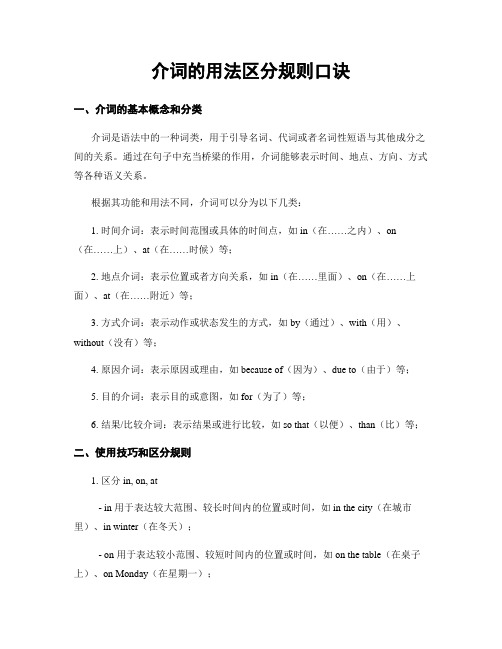
介词的用法区分规则口诀一、介词的基本概念和分类介词是语法中的一种词类,用于引导名词、代词或者名词性短语与其他成分之间的关系。
通过在句子中充当桥梁的作用,介词能够表示时间、地点、方向、方式等各种语义关系。
根据其功能和用法不同,介词可以分为以下几类:1. 时间介词:表示时间范围或具体的时间点,如in(在……之内)、on (在……上)、at(在……时候)等;2. 地点介词:表示位置或者方向关系,如in(在……里面)、on(在……上面)、at(在……附近)等;3. 方式介词:表示动作或状态发生的方式,如by(通过)、with(用)、without(没有)等;4. 原因介词:表示原因或理由,如because of(因为)、due to(由于)等;5. 目的介词:表示目的或意图,如for(为了)等;6. 结果/比较介词:表示结果或进行比较,如so that(以便)、than(比)等;二、使用技巧和区分规则1. 区分in, on, at- in 用于表达较大范围、较长时间内的位置或时间,如in the city(在城市里)、in winter(在冬天);- on 用于表达较小范围、较短时间内的位置或时间,如on the table(在桌子上)、on Monday(在星期一);- at 用于精确地点或特定时间,如at the library(在图书馆)、at 8 o'clock (在八点钟)。
2. 区分by, with, without- by 表示通过某种手段或方法,如by car(乘车)、communicate by email (通过电子邮件交流);- with 表示使用某种工具、器材等协助完成某事,如write with a pen(用钢笔写);- without 则表示没有某种条件或情况下进行某事,如drive without a license (没有驾照开车)。
3. 区分because of, due to- because of 强调的是起因,后面接名词或名词性短语,如because of the rain (因为下雨);- due to 强调的是结果,后面接名词性短语或动名词短语,常用来修饰由前面动作引起的后果,在句中通常位于主语之后。
田静五步做题法思维导图

田静五步做题法第一步初读:背生词,掐时间
时间掐时间做题
考场上平均每18分钟做10分
18+5=23分钟,最好在10-25分钟,不能超过半小时
生词不要查,基础过差先背田静整理好的核心词
第二步查读:对答案,查生词
利用现有资料田静(或者找其他来源)整理好的,节省查单词的时间
准备自己的生词本
第三步精读
文章:看文章的每句话
题目:思考每题的每个选项的正误原因
思考:标记不懂,带着问题去听课
第四步解读:听讲解重点关注方法(解题步骤,思考角度)
1看题干找关键词
2文章句子生词和派生词(考研考察的意思)
3标记:橙色题干定位,黄色正确信息,蓝色错误信息
4填空式讲义:无答案(课程中)
第五步研读:回顾+标记
回顾:生词+长难句+文章+题目+写作+素材(填空式讲义)
标记易错+错误原因(彩色笔)
嘱咐
真题学习顺序:真题五大题型的学习有先后顺序:词-句-段落-篇章,输入到
输出4月阅读6月完形填空翻译7月写作
顺序:先题干,找关键词(先少后多,初步定位到精确定位),再文章
解题:灵魂三问(包括同义改写)
有否对比原文,是否出现对应单词
全否选项信息是否在文章中全都能找到
匹配否选项跟题干的问题是否匹配
速度:不要盲目追求快,不要等着复习的时候再掌握
提高:真题的文章帮你提高英语,真题的题目帮你提高分数先做真题,陆续总结题型和方法
答案:记住答案不重要,重要的是要明确知道为什么
复习:不是全都做完了再复习,而是边学边复习
遍数:真题做1遍是不够的,至少要2-3遍
课前预习:真题核心词记忆
课后:填空式讲义复习
扎实稳步提升。
英语介词用法技巧ppt课件
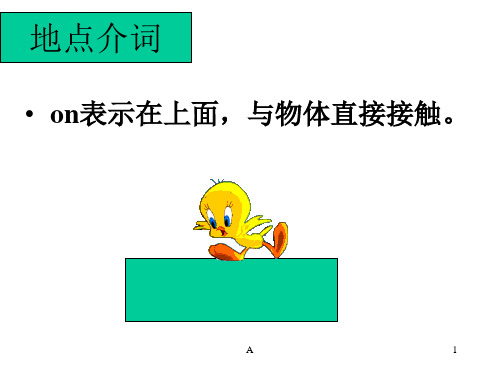
with a key…
使__用__工__具__用__介__词________ with
2. see with our eyes, do with our hands,
smell with our noses, eat with our
mouths…
使__用__器__官__用__介__词________ with
A
17
认识到了贫困户贫困的根本原因,才 能开始 对症下 药,然 后药到 病除。 近年来 国家对 扶贫工 作高度 重视, 已经展 开了“ 精准扶 贫”项 目
3. in English , in French , in your own words, in three languages…
_使__用___语__言__用__介___词___i_n__
A
19
(3)固定搭配: 认识到了贫困户贫困的根本原因,才能开始对症下药,然后药到病除。近年来国家对扶贫工作高度重视,已经展开了“精准扶贫”项目
到达 arrive _i_n_/_a_t_a place
找出 find _o_u_t
与---相处 get on _w_i_t_h_
害怕
be afraid _o_f sth.
20
认识到了贫困户贫困的根本原因,才 能开始 对症下 药,然 后药到 病除。 近年来 国家对 扶贫工 作高度 重视, 已经展 开了“ 精准扶 贫”项 目
1.害怕 2.对……惊讶 3.生气 4.对……兴奋 5.对……满意 6.以……著名 7.充满了 8.擅长 9.对……感兴趣 10.迟到 11.与……不同
• in表示在里面(在内部或在其中)
A
2
认识到了贫困户贫困的根本原因,才 能开始 对症下 药,然 后药到 病除。 近年来 国家对 扶贫工 作高度 重视, 已经展 开了“ 精准扶 贫”项 目
专项复习讲义小升初语法专题-介词

专项复习讲义小升初语法专题-介词专项复习讲义小升初语法专题介词在我们学习英语的过程中,介词可是一个非常重要的部分。
对于即将面临小升初的同学们来说,掌握好介词的用法,能够让我们的英语表达更加准确和流畅。
今天,咱们就一起来好好复习一下介词吧!首先,咱们来了解一下什么是介词。
介词是一种虚词,它不能单独使用,而是要和名词、代词或者相当于名词的其他词类、短语或从句一起构成介词短语,在句子中充当状语、定语、表语等成分。
比如说,“in the room”(在房间里),“on the table”(在桌子上),这里的“in”和“on”就是介词。
接下来,咱们看看常见的介词都有哪些。
常见的介词有at、in、on、under、behind、near、between、among、with、without、for、of、to、from 等等。
这些介词虽然看起来简单,但是用法可不少呢!先说说“at”,它通常用来表示在某个具体的时间点或者小地点。
比如说,“at six o'clock”(在六点钟),“at the bus stop”(在公交车站)。
“in”呢,一般用来表示在较大的时间范围或者空间范围内。
比如,“in the morning”(在早上),“in the room”(在房间里)。
“on”则常用来表示在具体的某一天或者在某个表面上。
例如,“on Monday”(在星期一),“on the desk”(在桌子上)。
“under”表示在下面,“behind”表示在后面,“near”表示在附近。
比如,“The cat is under the chair”(猫在椅子下面。
)“The tree is behindthe house”(树在房子后面。
)“The park is near my home”(公园在我家附近。
)“between”和“among”都有“在之间”的意思,但“between”通常用于两者之间,而“among”用于三者或三者以上之间。
介词讲义完整版

介词一;介词的分类1.简单介词;是指单个的介词如: in; on; at; on; to; with等2.合成介词;是指两个简单介词合在一起构成的介词如: into; onto; without; inside3.短语介词;是指一个或两个简单介词与一个或几个其他词类的词组合;在意义和作用上相当于一个简单介词的短语如: instead of 代替 because of因为according to按照 in front of 在...的前面二;表示时间的介词1.at表示具体的时间点如:at eight o’clock联想: at构成的固定短语:at first首先 at least至少at present目前 at noon在中午at the age of在...岁时 at the moment在目前;现在at the same time同时 at school 在上学at the end of在......末如: In some western countries shops are closed___________ weekends.2.in用于年;月;季节;上午;下午;晚上等..in March在三月 in spring在春天in 2008在2008年 in the morning/afternoon/evening注意: in表示在某一季节或某一月份时;一般不加冠词;但季节和月份的意义一旦具体化;就要加定冠词the..如: The weather is a little in May.An earthquake happened in Sichuan in the May of 2008.In summer children are happy because they can swim.联想:in构成的固定短语:hand in上交 in fact事实上in surprise吃惊地 in search of寻找in public当众 in the end最后;终于in no time立刻;马上 in a minute立刻;马上in front of在...前面 in a word一句话;总而言之in good health身体健康的 do well in在...方面干的不错be interested in对...感兴趣 in common共同的show great interest in对......感兴趣in the last/past several years在过去的几年里3.表示具体的某一天或某一天的早晨;晚上等;用on..如: In the morning I often get up at six o’clock but________Sunday morning; I get up at seven.A traffic accident happened near our school _________ the night of May 2nd; 2014.联想:on构成的固定短语:on board乘坐车;飞机 on duty值班;值日on earth到底 on fire着火on foot 步行 on hire雇佣on holiday度假 on time按时be on show展览 on the right在右边on the other hand另一方面 a book on history一本关于历史的书on one’s way to在某人去...的路上4.表示时间的since; for; by; during; until1since自从后跟具体的过去时间;for后接一段时间..for和since短语所在的句子应用现在完成时;谓语动词要用延续性动词..如:Great changes have taken place in my hometown since the year 2000.We have lived in the city for about five years.(2)by+时间点;意为“到...为止”;如果by后面跟的是将来的时间点;用一般将来时或将来完成时;如果by后面跟一个过去的时间点;用过去完成时..如: I will finish eating by nine o’clock.By the end of last week; we had finished learning Unit5.(3)during+时间段;与延续性动词连用;表示某期间的动作..如:She had trained hard during the four years to get ready for London Olympic Games.(4)until+时间点;意为“道...为止”;句中的谓语动词若是非延续性动词;构成句型not...until直到...才如: We stayed there until the sunset.We didn’t go home until the sunset.(5)表示时间前后的before; afterbefore在...之前; after在...之后如:We must hand in our homework before class.After half past eleven we can relax ourselves.注意:before作为介词;还可以表示“面临;面对”如:What should you do before so many difficultiesI had nothing to say before her.三.表示方位;地点;行为对象等的介词1.表示方位的介词in; to; onin表示包含关系;意为“在......范围内”;on表示相邻关系;接壤;to表示相隔关系..如:China is________ the east of Asia.Japan is ________ the east of China.Russia is ________ the north of China.2.表示“上下”等方位的介词over; under; above; below; on(1)over在......正上方;其反义词为under如:There is a football under the desk.I looked up and saw a plane flying over my head.(2)above表示“在......上方”;非垂直关系; 其反义词为below如:The plane is flying above the clouds.(3)on在......之上;指两者表面接触..其反义词也为under3.表示“前后”的介词和短语介词(1)in front of 在......前面;指在范围之外的前面;和before意义接近..如:There are some bikes in front of the teaching building.(2)behind是in front of 的反义词;意为“在......后面”(3)in the front of表示在范围之内的前面;其反义词组是at the back of4.by; beside在......旁边;between在两者之间; among在三者及以上之间(1)by和beside意义相近如:Do you know the man who is standing by the windowLucy sits beside me. She is my deskmate.(2)between指两者之间;也表示三者或多者中的每两者之间;among指三个或三个以上的事物或人之间..注意:between表示两者之间;只要构成双方关系;就可以用between如:There are so many desks in the classroom that there is hardly any room to move between them. 教室里有这么多张课桌;几乎没有空间从它们中间穿过..5.across; through穿过across从表面穿过;through穿越;穿透;透过;指从物体内部穿过..如:1When you go________ the road; you must be careful.2Which river runs________ Shanghai3 --I left my keys in the room yesterday. I had to get in________ the window.--It’s dangerous to do that.A. inB. throughC. overD. to6.表示里外的in; inside; into; onto; out of; outside(1)in在......之内如:My keys are in my pocket.注意:外来物“在树上”;用in;树上结出的东西“在树上”;用on如:There are some birds________ the tree.Autumn comes and some red apples________ the apple trees come into people’s eyes.(2)inside在......里面;到......里面..反义词为outside如:ListenSomeone is talking in a low voice inside the door.Don’t stay outside.(3)into到......内..强调空间或状态的转换..反义词为out of如: Why not go into the house and have a lookHe looked out of the window and saw some people coming back from work.注意: out of 还有“脱离;失去”等意义..如: He has been out of work for long.Fish can’t live long out of water.7.表示“靠近”的near; next to; aroundnear在......附近next to在......旁边around在......周围如: There is a park near our neighborhood.I didn’t remember to phone until near the end of the week.The mouse is next to my computer.That patient is next to death.The flowers and applause掌声 are always around the winners.注意:around 还表示“大约”;同义词:about如:It was around/about twelve o’clock in the evening.8.表示运动方向的for; to; towards(1)for常接在leave; start等动词之后;表示运动的方向或目的地..如: They’ll leave for Beijing to attend the meeting next month. (2)to跟在go; come; return; move等动词之后;表示目的地;它既表示运动方向;又包含运动结果..如:When did you return to Guangzhou after the summer holiday(3)towards朝;向..只说明运动的方向;没有“到达”的意思如: The teacher is coming towards the classroom now.9.表示行为对象的to; at一般来说;at 同某些动词连用;表示攻击目标;含有某种程度的恶意;to则只表示方向;并无恶意..如: I threw the ball to him and he threw it at the dog.He came________me and said hello to me.A dog came________her and she was frightened受惊吓的..10.最高级结构中表示范围的of; in同类比较时;若主语和范围一致;一般用of; of后多为数词或可数名词复数;将某人/某物置于集体或环境中进行比较时;用in; in后一般是可数名词的单数..如:She is the most beautiful girl ________ the three sisters.Tom is the tallest boy________ the class.四.表示“除......之外”的介词1.besides除......之外还如: Five others were late besides me.There will be five of us for dinner; besides John.2.but; except除......之外..but常与否定词连用如: No one but we knows about the news.He has few friends except you in this school.He has few friends except you in this school.They all went to sleep except me.3.except for表示从整体中排除;除......之外;前后不是一类事物..如: The care is really wonderful except for its price.The composition is quite good except for a few spelling mistakes.五.表示方式;手段或工具的介词1.by; in; on表交通方式by bike=on a bike; by car=in a car如:Do you usually come to school by bike2.by; in with表示手段或工具(1)by表示用某种方式或手段..名此前不加冠词..如: This pair of shoes is made by hand.The old man had to make money by selling vegetables.(2)in表示使用某种语言;用墨水;颜色;颜料等..名此前不加冠词..如: Can you say it in EnglishPlease write it in ink; not in pencil.(3)with后跟具体的工具如: People here build houses with stones.I like to write with a ball pen.拓展:with常用来表示伴随;意为“有;带有”;其反义词为without如:This is a house with a garden.Fish can’t live without water.六.引出动词不定式逻辑主语的介词..1.一般情况下用for sb. to do sth如:It’s necessary for us to learn English.It’s difficult for children to read such a book.2.表示品质;性格;特征的形容词后用of sb. to do sth.; 这类句型中动词不定式的逻辑主语和形容词构成主系表结构..如:It’s foolish of him to make such a decision.It’s kind of you to give me so much help.七.其它介词的用法1.as作为;as for至于如: ________students we should work hard.He works________ a teacher in this school.________him; I know nothing.2.thanks to 同because of;意为“因为;由于”如:Thanks to your help; I am good at my lessons.Because of the weather; we have to put off the sports meet.八.介词的省略1.in的省略be busy in doing sth忙于做某事have difficulty/trouble in doing sth.做某事有困难in this/that way以这种/那种方法spend...in doing sth. 花费......做某事have a good time in doing sth. 做某事很高兴waste... in doing浪费......做某事There’s no use/good in doing sth.做某事有用/没有好处2.for的省略for+时间段里的for;在口语中可以省略;尤其是在肯定句中..但是在否定句中或在句首一般不可以省略..如:The rain lasted for a whole afternoon.He has been waiting for three hours.We haven’t seen each other for a long time.For a whole month; there is no rain.九.常用介词短语1.常与with连用的短语do with处置;对付go on with继续......agree with同意......be busy with忙于keep/catch up with跟上fill...with....用......装满......be familiar with...熟悉......be popular with...受......欢迎be angry with sb.生某人的气cover...with....用......覆盖........ help...with...在......方面帮助...... get on well with与......相处的好be strict with sb.对某人要求严格be pleased with sb.对某人感到满意2.常与at 连用的短语look at看knock at敲at last最后at once立刻laugh at嘲笑......shoot at朝......射击work at致力于......be good at擅长......be weak at不擅长......arrive at到达某地小地方be amazed at对......感到吃惊3.常与on连用的短语get on上车turn on打开try on试穿put on穿上call on 号召depend on依靠;取决于live on 依赖........生活spend...on...在......上花费......4.常与of连用的短语hear of听说take care of照料look out of朝外看a kind of一种a type of一种be fond of喜欢instead of代替......think of认为;考虑all kinds of各种各样的be proud of为......而骄傲be confident of对......有信心be tired of对......感到厌烦be made of由......制成能看出材料be scared/afraid/terrified of...害怕......5.常与from连用的短语come from来自于be far from距离......远hear from收到......的来信across from在......的对面be different from与......不同borrow... from...从......借来......be made from由......制成看不出原料6.常与for连用的短语look for寻找for example例如be late for迟到be fit for适合wait for等候pay for为......付款for a while一会儿as for至于;关于be sorry for为......感到抱歉send for派人去请......leave for离开去......ask for请求;向......要...... thanks for为......感谢......get ready for为......做好准备be famous/known for以......而闻名7.常与to连用的短语get to到达turn to翻到pay attention to注意listen to听according to根据......be next to在......隔壁be friendly to对......友好to one’s joy使某人高兴的是be polite to sb. 对某人有礼貌to one’s surprise使某人惊讶的是。
田静考研英语语法课笔记之简单句
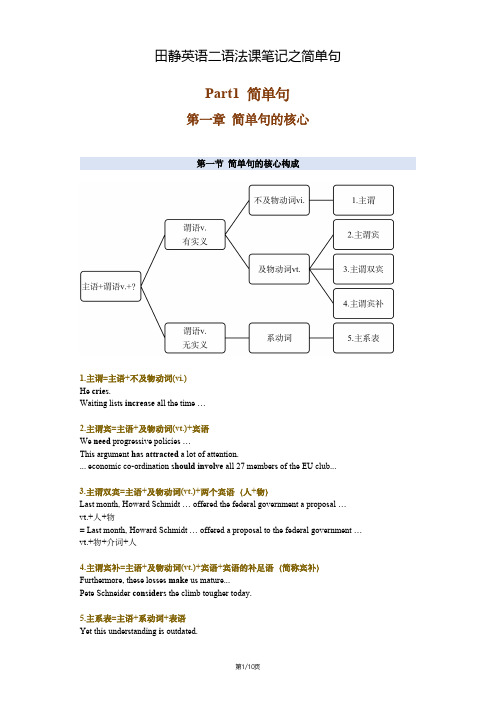
第一节简单句的核心构成1.主谓=主语+不及物动词(vi.)He cries .Waiting lists increase all the time …2.主谓宾=主语+及物动词(vt.)+宾语We need progressive policies …This argument has attracted a lot of attention....economic co-ordination should involve all 27members of the EU club...3.主谓双宾=主语+及物动词(vt.)+两个宾语(人+物)Last month,Howard Schmidt …offered the federal government a proposal …vt.+人+物=Last month,Howard Schmidt …offered a proposal to the federal government …vt.+物+介词+人4.主谓宾补=主语+及物动词(vt.)+宾语+宾语的补足语(简称宾补)Furthermore,these losses make us mature...Pete Schneider considers the climb tougher today.5.主系表=主语+系动词+表语Yet this understanding is outdated.Part1 简单句第一章简单句的核心田静英语二语法课笔记之简单句第二节简单句的核心变化主语+谓语动词(动词的时态、情态、语态、否定、强调)一、谓语动词的时态1.一般时态(1)一般过去时:谓语动词=didThe outbreak came to global notice in late April2009...That was bad to my overall fitness goals.(2)一般现在时:谓语动词=do/doesHowever,a true cashless society is probably not around the corner.I have an Excel template for a week of breakfast,lunch and dinner.Each book opens up new avenues of knowledge…(3)一般将来时:谓语动词=will+do或am/is/are going to+do...people will simply become lazy and depressed.Will the European Union make it?...the future will be a wasteland of a different sort…(4)(一般)过去将来时:谓语动词=would+do或was/were going to+do(Facebook promised the European commission…)it would not link phone numbers to Facebook identities…2.进行时态(1)过去进行时:谓语动词=was/were doingThe position was just taking up too much time,she said.(2)现在进行时:谓语动词=am/is/are+doingNow shortages are appearing at the mid-skill levels.(3)将来进行时:谓语动词=will be+doing(其中be动词永远用原型be)Native U.S.workers won't be returning to the farm.3.完成时态(1)过去完成时:谓语动词=had+doneBy February the next year Ms.Simmons had left the board.Companies had won patents for isolated DNA for decades…Many said that unemployment...had improved them in some ways...(2)现在完成时:谓语动词=have/has+donePeople have speculated for centuries about a future without work.…since2010,drought and insects have killed over100million trees in California…The“brain drain”has long bothered policymakers in poor countries.现在完成时vs一般过去时宏观上:两者涉及的时间不同。
2023考研英语田静语法及长难句
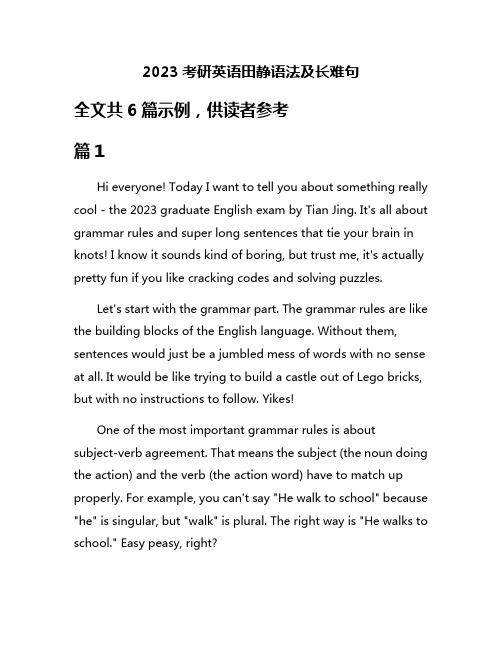
2023考研英语田静语法及长难句全文共6篇示例,供读者参考篇1Hi everyone! Today I want to tell you about something really cool - the 2023 graduate English exam by Tian Jing. It's all about grammar rules and super long sentences that tie your brain in knots! I know it sounds kind of boring, but trust me, it's actually pretty fun if you like cracking codes and solving puzzles.Let's start with the grammar part. The grammar rules are like the building blocks of the English language. Without them, sentences would just be a jumbled mess of words with no sense at all. It would be like trying to build a castle out of Lego bricks, but with no instructions to follow. Yikes!One of the most important grammar rules is about subject-verb agreement. That means the subject (the noun doing the action) and the verb (the action word) have to match up properly. For example, you can't say "He walk to school" because "he" is singular, but "walk" is plural. The right way is "He walks to school." Easy peasy, right?Next up, we have those crazy long sentences that make your head spin. I'm talking about sentences that go on and on, with clause after clause, until you've totally forgotten what the main idea was supposed to be! It's like being lost in a never-ending maze of words.But you know what? Tackling those long sentences is kind of like playing a game of mental gymnastics. You have to keep track of all the different parts, figure out how they relate to each other, and then put the whole thing together in your mind. It's a real brain workout!Now, I know what you're thinking: "Why do we have to learn all this complicated stuff?" Well, here's the thing: being able to understand and use proper grammar and sentence structure is super important for clear communication. It's like having a secret code that lets you express your thoughts and ideas in a way that everyone can understand.Imagine trying to give directions to your friend's house, but instead of saying "Turn left at the big oak tree, then go straight for two blocks," you just said a jumbled mess of words like "Tree big left straight blocks two." Your friend would be totally lost!So, while it might seem tedious at times, learning all those grammar rules and practicing with those long sentences isactually really useful. It's like leveling up your language skills to become a master communicator!And you know what else? Mastering grammar and sentence structure can even help you in other subjects, like math and science. After all, those subjects have their own sets of rules and formulas that you need to follow precisely. If you can nail the grammar stuff, tackling those other subjects will be a piece of cake!Alright, I think that's enough talking about grammar and sentences for now. Let's take a little break and play some word games or something. But remember, even though it might seem tough at times, learning all those rules and practicing with those crazy long sentences is totally worth it in the end. You'll be a language warrior, ready to take on the world with your mad communication skills!Who's with me? Let's go crush those Tian Jing grammar and sentence challenges!篇2The Big Tough English Exam for Grown-UpsHi there, kids! Today, we're going to talk about something called the "Graduate English Exam". It's a really important test that older students have to take if they want to go to an even bigger school after college. Sounds pretty scary, right?Well, one part of this exam is all about grammar. You know what grammar is, right? It's those rules we have to follow when putting words together to make sense. Things like where to put verbs, how to make plurals, and all that good stuff. The graduate exam has a whole section just on grammar rules!Now, there's this really smart lady named Tian Jing who is an expert on English grammar for these big tests. She wrote a special book all about the grammar rules that show up most often. Her book helps students learn the tricky grammar they need to know.One of the biggest challenges is something called "long difficult sentences". Yeah, you guessed it - those are sentences that just go on and on and on! They have so many clauses and phrases packed in that they can make your head spin. Like this one:"After having been told by their teacher that they would be going on a field trip to the museum the following week, providedthat the weather was sunny and warm, the excited students could hardly wait for their parents to sign the permission slips."Whew, that's a mouthful! See how it keeps adding more and more details in between all the parts? That's what makes it so difficult.Tian Jing's book teaches special tricks for understanding these crazy-long sentences. One trick is breaking them down piece by piece to identify the main subject, verb, and other important parts. Another is looking for clue words that separate the different clauses and phrases.Some of the other grammar topics covered are things like:Parallel structure (making sure similar parts of a sentence follow the same patterns)Modifiers (describing words that have to go in just the right place)Verb tenses (using the correct past, present, future verb forms)The book explains all the rules simply, with lots of examples. It's like having your own grammar tutor!Can you imagine having to take a test with all those big, grown-up grammar concepts? I'm getting tongue-tied just thinking about it! That's why I'm really glad experts like Tian Jing are out there, helping older students get prepared for these huge challenges.Well, that's all for my lesson on the "2023 Graduate English Exam: Grammar and Long Difficult Sentences by Tian Jing". Let me know if you have any other questions! Maybe we can get a few more grammar lessons in before naptime.篇3Grammar is So Hard for the Big Test!Hi friends! Tommy here. I'm in 5th grade and I really want to go to a great university when I'm older. But first, I have to take this huge test called the graduate entrance exam. Part of it is all about English grammar and understanding super long, crazy sentences. My teacher says it's going to be really hard, but I'm trying my best to get ready.The first thing I'm studying is parts of speech. Those are all the different types of words like nouns, verbs, adjectives, and more. Nouns are person, place, or thing words. Verbs are actionwords. Adjectives describe nouns. It's important to know what role each word plays in a sentence.Then there are all the different verb tenses. Simple present tense is like "I play soccer." Simple past is "I played soccer yesterday." There's also present progressive which is "I am playing soccer right now!" My head is spinning just thinking about all the tenses I need to learn - past perfect, future perfect, and more. Yikes!Next up is subject-verb agreement. This means making sure my verbs match up with the subjects properly. Like "He runs fast" instead of "He run fast." It seems easy but there are so many rules around singular and plural subjects. I always have to double check myself.But the hardest part might be the long, complicated sentences on the reading comprehension. The passages are filled with sentences that go on forever with multiple clauses, phrases, and all sorts of craziness. Like this one:"Having understood that successfully navigating the intricacies of the language section, replete with examinations on grammatical concepts ranging from noun clauses and conditionals to voice and mechanics, in addition to emphasizing proficient comprehension of extensive passages containingeloquently constructed but extraordinarily protracted sentences like this very one, would be paramount to achieving exceptional results, the tenacious student invested copious efforts into diligent preparation."See what I mean? Who can even understand what that's trying to say? There are so many crazy words, and clauses within clauses. Sometimes I get lost and have to start over two or three times. My teacher says I need to learn to identify the subject, verb, clauses, and structure to follow along. Ugh, it's so hard!Despite how difficult and confusing English grammar can be, I'm not giving up. I'm going to study my strategies for sentence analysis every day. I'll learn all the rules for verbs, nouns, adjectives and more. Pretty soon, I'll be a grammar genius! Well, maybe not a genius. But at least I'll pass that crazy test. Then it's on to my dream university. Keep studying, grammar stars!篇42023 Exam English Grammar and Long Sentences by TinaHi everyone! My name is Tina and I'm in 5th grade. I love reading, writing, and learning about English. My big sister is studying really hard to take the graduate entrance exam nextyear. She's been asking me to help her practice English grammar and long sentence structure. I've been learning a lot too!One of the biggest things in English grammar is parts of speech. There are 8 main parts: nouns, verbs, adjectives, adverbs, pronouns, prepositions, conjunctions, and interjections. Nouns are people, places, things or ideas. Verbs are action words. Adjectives describe nouns. Adverbs describe verbs, adjectives or other adverbs. Pronouns take the place of nouns. Prepositions show location or direction. Conjunctions join words or sentences. Interjections are neat words that show emotion like "Wow!"It's really important to identify the parts of speech to understand how sentences are built. Simple sentences have a subject and a verb like "The cat ran." More complex sentences add objects, like "The cat chased the mouse." You can expand on that by adding adjectives, like "The gray cat quickly chased the tiny mouse." See how those describing words make it more clear?One of the hardest things about English is getting the verb tenses right. There are simple tenses like past, present, and future. But then there are perfect tenses too. Like, "I had walked" is past perfect. "I will have walked" is future perfect. Keeping those all straight is tricky!Another grammar key is subject-verb agreement. Singular subjects get singular verbs and plural subjects get plural verbs. Like, "The boy runs" but "The boys run." Seems easy but it gets harder with collective nouns and phrases between the subject and verb.Oh and you have to watch out for common grammar mistakes! Things like run-on sentences, fragments, misplaced modifiers, and pronoun disagreement errors. A bunch of grammar rules to remember. Sometimes I feel like my head will explode from all the exceptions and special cases!My big sister has also been practicing really long, complex sentences for her exam. Long sentences can communicate sophisticated ideas but they have to be structured properly. You need the right punctuation, parallel construction, and transition words to make them flow logically.Here's an example of a grammar-perfect but crazy long sentence:After being rudely awoken by the buzzing of the alarm at the crack of dawn, fumbling to locate her phone with blurred,half-open eyes, only to realize it was not her typical wake-up call but rather a dreadfully ominous emergency notification, Samantha, an up-and-coming marketing executive who typicallyexuded an air of calm and composure even in the mosthigh-pressure situations, felt her heart beginning to palpitate rapidly as her mind raced with visions of potential calamities, fearing the absolute worst until she regained enough wherewithal to actually read the message, her worries momentarily dissipating as it mereCly warned of an impending storm, only to resurface when glancing out the window to dark, ominous clouds forming on the horizon, knowing her already daunting morning commute would likely descend into sheer chaos and gridlock, as it so often did during inclement weather conditions in this ill-equipped, traffic-clogged metropolis.Phew! I need to take a breath after that one. Long sentences are no joke. You have to be really careful with all the clauses, commas, parallel construction, and making sure everything is grammatically correct. The grammar rules get extra tricky with the length and complexity.My sister has shown me tons of examples of long, confusing sentences from past exams. Some look like mistranslated jibberish from another language. Others start making sense but then trail off into a labyrinth of dependent clauses and prepositional phrases that leaves you scratching your head.I admire her persistence for grinding away at all those practice sentences. But as a 5th grader, I have to admit that a lot of the long, complicated grammatical structures go way over my head. I'm still working on mastering the basics of simple and compound sentences. Maybe by high school I'll be ready to dive into the dizzying world of sophisticated grammar constructions!For now, I'll do my best to help my sister review parts of speech, subject-verb agreement, and punctuation rules. Baby steps towards untangling the enigma that is the English language. I'm rooting for her to ace that grammar section! Maybe one day I'll be up for those mind-bending long sentences myself. But today is not that day.Thanks for reading my article! I hope it gave you akids-eye-view into some of the grammar concepts being prepped for the big 2023 exam. While some grammatical rules can seem awfully convoluted to a 10-year-old, I have a new appreciation for just how elaborate and nuanced the English language can be, especially at advanced levels. Kudos to anyone grinding through those labyrinthine sentence practice drills! I'm sticking to "See Spot run" for now.篇5Sure! Here's a 1000-word article on "Tian Jing's Grammar and Complex Sentences in the 2023 Postgraduate Entrance Examination" written in English, using a language style suitable for elementary school students:Learning Grammar with Tian Jing and Her Amazing Sentences!Hey there, fellow little learners! Today, we're going to dive into the exciting world of grammar and tackle some tricky long sentences with our friend, Tian Jing. She's a smart lady who knows all about English grammar, and she's here to help us out!What is Grammar?Grammar is like the rules of a language. Just like when you play a game, there are certain rules you need to follow to make sure everything makes sense. In English, grammar helps us put words together in the right way, so we can express ourselves clearly.Meet Tian Jing!Tian Jing is a famous scholar who loves studying grammar. She believes that understanding grammar can make our English better and more powerful. She's known for her amazing ability to create long and complex sentences that impress everyone!Let's Learn from Tian Jing!Nouns: Nouns are words that name people, places, things, or ideas. For example, "dog," "cat," "book," and "happiness" are all nouns. Tian Jing loves using nouns to describe things vividly. She says, "The fluffy white clouds floated gracefully across the bright blue sky, like cotton candy in the air!"Verbs: Verbs are action words that show what someone or something is doing. For example, "run," "jump," "eat," and "play" are verbs. Tian Jing uses verbs to make her sentences lively. She says, "Lisa giggled with joy as she danced happily under the rainbow."Adjectives: Adjectives are words that describe or modify nouns. They tell us more about the noun. For example, "big," "happy," "red," and "beautiful" are adjectives. Tian Jing uses adjectives to paint colorful pictures in our minds. She says, "The tall, majestic tree stood proudly in the middle of the lush green forest."Adverbs: Adverbs are words that describe or modify verbs, adjectives, or other adverbs. They tell us how, when, or where something happens. For example, "quickly," "happily," "now," and "here" are adverbs. Tian Jing uses adverbs to add extra details to her sentences. She says, "The little bird chirped cheerfully as it flew gracefully through the sky."Complex Sentences: Tian Jing loves to challenge herself by creating long and complex sentences. These sentences have more than one clause, and they make her writing more interesting. For example, she says, "Although it was raining heavily, the brave children continued playing soccer in the muddy field, laughing and cheering each other on."Why Learn Grammar?Learning grammar helps us become better communicators. When we understand grammar, we can express our ideas clearly and write amazing stories or essays, just like Tian Jing! It also helps us understand what we read and follow instructions correctly.Practice Makes Perfect!To become grammar superstars like Tian Jing, we need to practice. We can read books, write stories, and have fun with grammar games. The more we practice, the better we'll get!ConclusionLearning grammar doesn't have to be boring, my little friends. With the help of Tian Jing and her incredible sentences, we can learn grammar in a fun and exciting way. So let's dive into the world of nouns, verbs, adjectives, adverbs, and complex sentences, and become grammar superheroes!Remember, practice makes perfect! Keep learning, keep exploring, and soon you'll be writing like a pro. Good luck on your grammar adventures!Note: This article is a fictional piece written for entertainment purposes. Tian Jing is a made-up character created solely for this article.篇6Studying for the Big TestWow, the 2023 postgraduate exam in English is coming up soon! I've been working really hard to get ready. My big sister is taking it, and she's been telling me all about the grammar andthose super long, twisted sentences they make you read. It sounds kind of scary, but also fun to learn!The first thing she taught me about English grammar for the test is all the verb tenses. In English, we have simple tenses like present ("I walk"), past ("I walked"), and future ("I will walk"). But then there are fancy progressive tenses with "is/was/will be" plus the -ing form, like "I am walking" for present progressive. There are also perfect tenses with "have/had/will have" plus the past participle, like "I have walked" for present perfect. And you can combine them into tenses like past perfect progressive ("I had been walking"). Phew, that's a lot of tenses!My sister showed me how to keep the subject and verb straight, even in complex sentences. Like, "The student who is studying grammar will pass the test." See how "student" is the subject, and it matches with "will pass"? Super important to make those agree. Sometimes there are multiple clauses or phrases packed into one sentence, so you have to carefully follow the subject trail.Then there are all the different kinds of clauses and phrases to learn about. Like adjective clauses that modify nouns ("The student who studies will pass"). Or adverb clauses that modify verbs, adjectives or other adverbs ("Because she studied hard,she passed"). Noun clauses can act as subjects or objects ("What she said was correct"). It makes my head spin a little!Another tricky part is identifying things like gerunds, infinitives, and participles. A gerund is a verb form ending in -ing that acts like a noun, like "Swimming is fun." Infinitives are the "to" form, like "to swim." And participles are-ing forms or -ed forms that act as adjectives, like "the swimming dog" or "the baked bread." You have to spot them in the sentences."Having been exhausted after an unexpected, grueling hike through the remote wilderness areas, where ferocious grizzlies were rumored to roam, the inexperienced campers, who had hoped to reconnect with nature by "roughing it" for a few days, immediately realized their woeful lack of preparedness for such an expedition upon encountering the first signs of an approaching storm."Whoa! See how it starts with a participle phrase "Having been exhausted..." to describe the subject "the campers"? And there are multiple clauses and phrases packed in there? You really have to follow the trail and think it through step-by-step. No wonder my sister is studying so hard!Even though all these grammar rules and sentence structures seem really hard, I actually find them kind offascinating. It's like cracking a code or solving a puzzle. My big goal is to keep working with my sister so I can start reading some of those crazy-complex sentences and identifying all the elements too. Then maybe in a few years, I'll be ready to take the postgraduate English exam myself!Overall, I've learned that preparation for the English section of the big test requires mastering verb tenses, clauses, phrases, and being able to analyze even the most wildly twisted sentences. It's a huge challenge, but kind of fun if you think of it like one giant game or logic puzzle. I'll keep practicing and doing my best to get ready. Someday I may even be a grammar master myself!。
初中语法--介词

一、什么是介词介词是一种虚词,一般在句子中不重读,也不能单独充当句子成分,但与它的介词宾语一起构成介词短语,就可以在句子中作状语、定语和表语。
介词又称前置词,一般位于名词或代词的前面,表示该词与句子其他成分的关系。
在学习介词时,最重要的是掌握介词的用法,动介词组的搭配,时间介词、方位介词、方向介词、位置介词、成语介词以及动向介词和静向介词的比较和区别。
二、介词的定义及句法功能介词是一种虚词,在句中不单独作任何句子成分,只表示其后的名词或相当于名词的词语与其他句子成分的关系。
介词后的名词,或相当于名词的其他词组、短语或从句,称为介词宾语。
介词和介词宾语一起构成介词短语。
介词短语在句中主要用作定语、状语、表语和宾语补足语。
The boy over there is my brother.(作定语)A friend in need is a friend indeed.(作定语)I shall meet you at the entrance of Qianmen Hotel.(作地点状语)To their surprise, they saw not locusts, but seagulls.(作原因状语)I’ll be in the office every afternoon.(作表语)He isn’t at home(作表语)The farmer made the king out of the water.(作宾语补足语)I found everything in good order(作宾语补足语)三、介词与其他词类的固定搭配。
介词和动词、形容词、名词等常构成固定搭配。
也就是说,在这些词的后面,常常要求用一定的介词。
1、形容词与介词的固定搭配有些形容词后面要求用固定的介词,这类介词常见的有:about, at, for, from, in, of, to, with(1)形容词+aboutcareful about hopeful about sure aboutHe is careless about his clothes(2)形容词+at(3)形容词+ forfamous for ready for sorry forI’m terrible sorry for telling him the truth.(4)形容词+ fromdifferent from safe fromHe was absent from class this morningMy sister is different from me in many ways.(5)形容词+ ininterested in successful inHe is interested in making model ships.2、名词与介词的固定搭配(1)名词+ forHe made up an excuse for being late.Did you find the cause for your failure?(2)名词+ inHe has some difficulty in translating the bookShe has made great progress in English.(3)名词+ ofShe found another way of solving the problemHe forms a bad habit of getting up late(4)名词+ onThere have been several attacks on foreigners recently. Have pity on me!(5)名词+ withI wanted to have a talk with youHe is always getting into trouble with the police。
介词讲义--(田静)
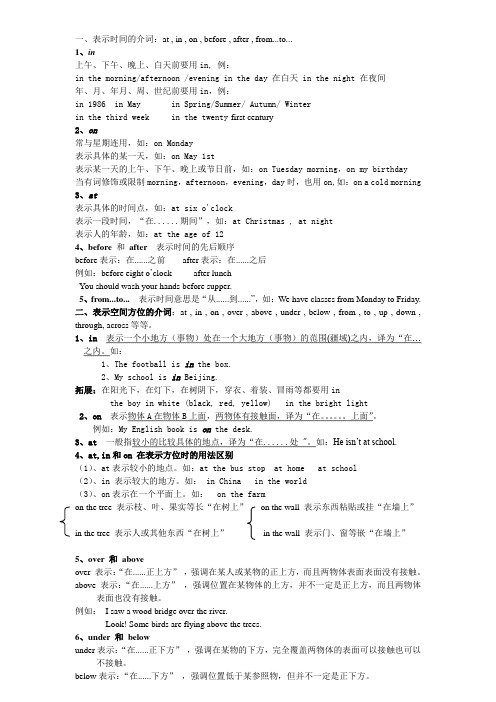
一、表示时间的介词:at , in , on , before , after , from...to...1、in上午、下午、晚上、白天前要用in, 例:in the morning/afternoon /evening in the day 在白天 in the night 在夜间年、月、年月、周、世纪前要用in,例:in 1986 in May in Spring/Summer/ Autumn/ Winterin the third week in the twenty-first century2、on常与星期连用,如:on Monday表示具体的某一天,如:on May 1st表示某一天的上午、下午、晚上或节日前,如:on Tuesday morning,on my birthday 当有词修饰或限制morning,afternoon,evening,day时,也用on,如:on a cold morning 3、at表示具体的时间点,如:at six o'clock表示一段时间,“在......期间”,如:at Christmas , at night表示人的年龄,如:at the age of 124、before 和after表示时间的先后顺序before表示:在......之前after表示:在......之后例如:before eight o’clock after lunchY ou should wash your hands before supper.5、from...to...表示时间意思是“从......到......”,如:We have classes from Monday to Friday.二、表示空间方位的介词:at , in , on , over , above , under , below , from , to , up , down , through, across等等。
九年级初中英语介词讲义全

九年级初中英语介词讲义全一、选择题1.The blue planet is so far from the earth that radio signals, travel ________ the speed of light, take 16 hours to reach the spacecraft.A.for B.in C.on D.at2.My family get together and have a big dinner ________ Sundays.A.at B.in C.on D.to3.Taking part in a social activity can help take your mind ________ matters that worry you and make you feel good about yourself.A.through B.across C.off D.into4.A study shows that rude languages spoken to children may have bad results that go ________ those of beating them.A.against B.beyond C.except D.with 5.Sometimes I feel stressed because what my parents want me to do has gone ________ my ability.A.through B.against C.above D.beyond6.On sunny days, my grandma often reads a novel ________ the window.A.for B.by C.with D.from7.Xinjiang cotton is praised ________ the best cotton in the country ________ its high quality. A.for; as B.for; by C.as; for D.by; for8.Some of the technology we’ve seen on screen is ________ our ability to create. But that might not be true for long.A.against B.during C.beyond D.through9.The ending of the film Diary of Dinosaurs was so surprising and fully went ________ my imagination.A.across B.over C.through D.beyond10.It is believed that ________ December 21, 1891, the first basketball game in history was played.A.in B.on C.at D.for11.In western countries, children play “trick or treat” ________ the evening of October 31st. A.at B.in C.on D.to12.—I can’t think of any other actress who is more beautiful than Au drey Hepburn.—You’ve got the point. Her beauty is ________ words and she succeeded ________ hard work. A.over; by B.over; throughC.beyond; by D.beyond; through13.________ Friday afternoon, our school ends earlier than usual.A.At B.On C.To D.In 14.Everyone was touched ________ words after they watched the film Hi, MOM 《你好,李焕英》directed by Jia Ling.A.under B.across C.beyond D.against15.—When is your birthday?—My birthday is ________ August 21st.A.on B.at C.in D.for16.The chopsticks are ________ wood.A.made of B.made from C.made in D.made with 17.The girl is ________ a singer ________ everyone in her hometown.A.well known as; for B.well-know as; toC.well known as; to D.best known for; for18.The girl is _____ a singer _____ everyone in her hometown.A.well known as; for B.well known as; to C.well-know as; to D.best known for; for 19.The workers will build a new road ________ the two villages.A.from B.among C.at D.between 20.— Maybe you should call her up.—But I don’t want to talk with her ________ the phone.A.at B.in C.on D.with 21.—There have been great changes in Taizhou in the past few years.—I can't agree more. The changes there are ________ my imagination.A.near B.past C.along D.beyond22.—A serious study of physics is impossible ________ some knowledge of maths.—I couldn’t agree more. So we should also learn maths well.A.among B.between C.against D.without23.The little stream ran dawn from a high mountain ________ many villages and forests. A.across B.against C.beyond D.through 24.—Why can’t we drive in the emergency lane (应急车道) on expressway?—Because the lane makes it possible to race ________ the clock to save people’s lives. A.beyond B.over C.against D.through 25.— Would you like to visit the zoo with me now?—Sorry, it’s _______ the visiting hours. Let’s go there tomorrow.A.beyond B.through C.during D.on26.My family is always ___________ me no matter what I decide to do. That makes me very pleased.A.above B.behind C.against D.through 27.Switzerland lies ________ France, Germany, Austria and Italy.A.between B.among C.against D.beyond28.To our joy, Tom pleased everybody by making his dog walk ________ two legs.A.by B.over C.from D.on29.—How did you get to the zoo, Helen?—I went to the bus station ________ my bike, and took the No. l bus to the zoo.A.on B.by C.in D.with 30.—How long have you lived in the new building?—_____2010.A.After B.In C.Since D.Before 31.Don’t be afraid of difficulties. Remember: kites rise highest ________ the wind, not with it. A.over B.against C.across D.along32.You shouldn’t eat so much chocolate _________ meals. Because it will affect your appetite. A.except B.through C.between D.unless 33.Armstrong joined the navy in 1949 and served _______ a pilot for three years.A.with B.like C.to D.as34.—How can I improve my English more quickly, Tom?—__________listening and reading more.A.At B.Across C.By D.On35.He has developed a good habit of running ________ the lake every morning.A.over B.along C.beyond D.across 36.—The boy is tall enough ________ his age.—Yes, I was much shorter when I was his age.A.of B.at C.from D.for37.—The earthquake in Ya’an took place ________ two past eight ________ the morning of April 20th.—Yes, some people were still sleeping for it was weekend.A.in; on B.on; in C.at; in D.at; on38.There is a stone bridge ________ the river in front of my house.A.over B.under C.above D.below39.Wu Mengchao, known as the “father of Chinese hepatobiliary surgery” passed away________ the age of 99 on Saturday.A.on B.in C.at D.by40.When are you arriving? I’ll pick you up the station.A.at B.to C.on D.off【参考答案】一、选择题1.D解析:D【详解】句意:这颗蓝色的行星离地球如此之远,以光速传播的无线电信号需要16个小时才能到达航天器。
最新田静语法64课时讲义
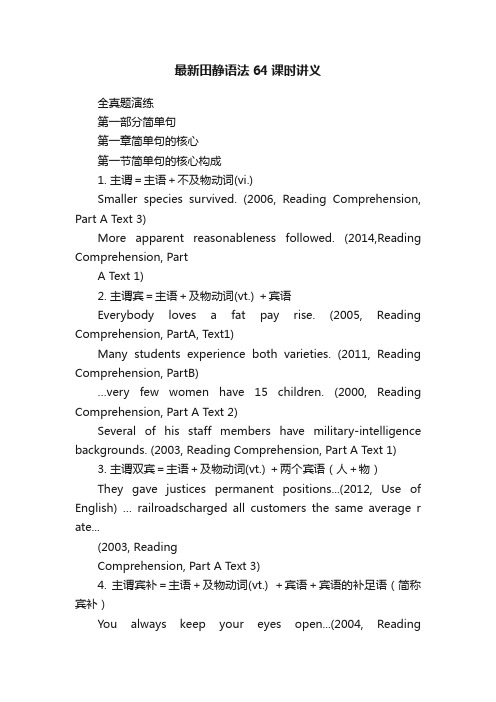
最新田静语法64课时讲义全真题演练第一部分简单句第一章简单句的核心第一节简单句的核心构成1. 主谓=主语+不及物动词(vi.)Smaller species survived. (2006, Reading Comprehension, Part A Text 3)More apparent reasonableness followed. (2014,Reading Comprehension, PartA Text 1)2. 主谓宾=主语+及物动词(vt.) +宾语Everybody loves a fat pay rise. (2005, Reading Comprehension, PartA, Text1)Many students experience both varieties. (2011, Reading Comprehension, PartB)…very few women have 15 children. (2000, Reading Comprehension, Part A Text 2)Several of his staff members have military-intelligence backgrounds. (2003, Reading Comprehension, Part A Text 1)3. 主谓双宾=主语+及物动词(vt.) +两个宾语(人+物)They gave justices permanent positions...(2012, Use of English) …railroadscharged all customers the same average r ate...(2003, ReadingComprehension, Part A Text 3)4. 主谓宾补=主语+及物动词(vt.) +宾语+宾语的补足语(简称宾补)You always keep your eyes open...(2004, ReadingComprehension, Part A Text1)The spooks call it "open source intelligence,"...(2003, Reading Comprehension,Part A Text 1)5. 主系表=主语+系动词+表语This is a dangerous game... (2005, Reading Comprehension, PartA, Text2)考研真题中常出现的系动词,总结如下:系动词表达含义真题例句be 单独出现(无其他实义动词)“是”Anthropology is one of the social sciences.(2003, Translation) get/become/turn/go/grow“变得”…their behavior became markedly different.(2005, Reading Comprehension, PartA, Text1)look/sound/smell/taste/feel感官动词“看/听/闻/尝/感觉起来……”They look cute. (2005, Reading Comprehension,PartA, Text1)And most folks still feel pretty comfortableabout their ability...(2004, ReadingComprehension, Part A Text 3) keep / remain/seem/appear/prove“保持着……”“似乎……”“证明出,显示出……”The prospect seems remote. (2010, Reading Comprehension, Part A Text 1)Nonetheless, unification of sorts remains a major goal.(2012, Translation)真题演练:请用下划线标出谓语动词的部分,并判断谓语动词的种类及简单句的种类。
八年级英语下册介词复习知识讲解
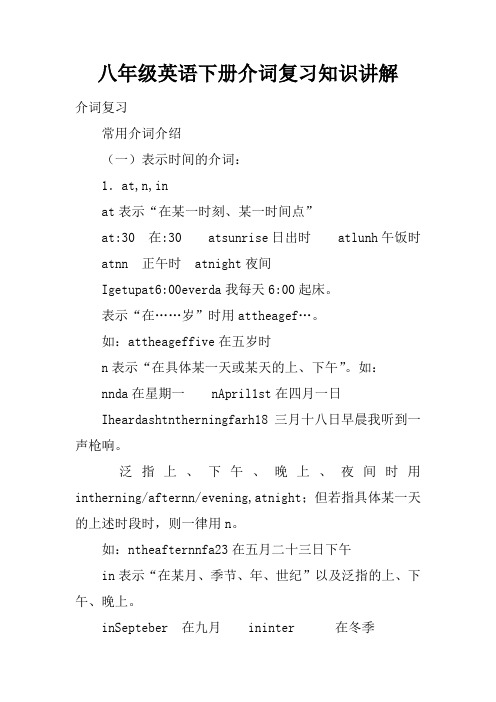
八年级英语下册介词复习知识讲解介词复习常用介词介绍(一)表示时间的介词:1.at,n,inat表示“在某一时刻、某一时间点”at:30 在:30 atsunrise日出时atlunh午饭时atnn 正午时atnight夜间Igetupat6:00everda我每天6:00起床。
表示“在……岁”时用attheagef…。
如:attheageffive在五岁时n表示“在具体某一天或某天的上、下午”。
如:nnda在星期一nApril1st在四月一日Iheardashtntherningfarh18三月十八日早晨我听到一声枪响。
泛指上、下午、晚上、夜间时用intherning/afternn/evening,atnight;但若指具体某一天的上述时段时,则一律用n。
如:ntheafternnfa23在五月二十三日下午in表示“在某月、季节、年、世纪”以及泛指的上、下午、晚上。
inSepteber 在九月ininter 在冬季in1999 在1999年inthe20thentur 在20世纪intherning/afternn/evening在上午/下午/晚上2.fr,during,thrughfr表示“一段时间”,后接与数词连用的时间名词。
多与完成时连用。
I’vebeenasldierfrears我入伍已年了。
Shehasbeenillfrseveraldas她已经病了几天了。
表示“持续一段时间”时,fr后面必须跟“数字+时间名词”,而during后决不可接数字。
during表示“在……期间”Hevisitedannieplaesduringhisstahere在他逗留期间他参观了许多美丽的地方。
hatdidudduringthesuervaatin?你在暑假做了什么?thrugh表示“一直……,自始至终”Theredhardthrughtheinter整个冬天他们都在努力工作。
Shetreatedelieherbrtherthrughtheseears这些年来她始终把我当哥哥对待。
第七章介词(思维导图+知识梳理+好题精炼)2022-2023初中英语中考语法归纳

表让步,如 despite ,in spite of 等.
表对于,如 at, for, over, to, with 等.
表关于,如 h regard to, as for, as to 等.
表根据,如 on, according to 等.
地点、空间和其他关系.介词后面的名词、代词或其他成分作介词的宾语.介词与它后面的宾语一起构成介词 短语才能在句子中充当某一成分.介词短语在句中主要用作:
(一)作主语 From Hangzhou to Shanghai is three hours by train.从杭州到上海坐火车要三小时. (二)作宾语的介词 A pretty girl appeared from behind the curtain.一个漂亮女孩从帘子后面出现了. (三)作表语 I'm in need of your help.我需要你的帮助. (四)作定语 I have lost the key to the door of my room.我把房间的钥匙丢了. A friend in need is a friend indeed.患难的朋友才是真朋友. (五)作宾语补足语 I found him in a hurry.我发现他匆匆忙忙的. (六)作状语 Lessons begin at eight.八点开始上课. On the top of the hill we can see how beautiful Beijing is.在山顶上,我们看到了好美的北京城. 四、常见介词归类 (一)表示时间的介词及介词短语 in, at, on, before, after, till, since, for, from...to, until, by, in the middle of, at the beginning of, at the end of, at half past five, at night, in a week, in the morning, in class, at sunrise, in spring/summer/autumn/winter, on Sunday, on Saturday afternoon, on a winter evening, for a long time, for two months, after school, since liberation, before lunch, at the time of, at the age of (二)表示地点的介词及介词短语 in. at, into, to, on, beside, before, behind, above, under, outside, inside, up, from, far from, near, across, off, down, among, past, between, out of, around, in the front of, in the middle of, at the back of, at the foot of, at home, at the gate, at the table, in the sky. on the ground, in a tree, in the south, in the sun, in the bed, on one's way home, by the side of (三)其他各类介词 表除去,如 besides, but, except 等.
田静最全语法知识点

田静最全语法知识点●第一部分:简单句●第一章简单句的核心●简单句的核心构成(主语+谓语动词+?)●谓语动词分类●实义动词●不及物动词 vi.●“不及物”——“不涉及别的物”●主语可独立完成动作●不需要加上任何对象(不接宾语)●及物动词 vt.●“及物”——“涉及别的物”●主语不能独立完成动作●加上动作涉及的物(动词宾语)●非实义动词●没有实在的动作含义●通过系动词把句子连系起来●实义动词●主语+不及物动词●1 主谓●主语+不及物动词+介词+宾语vi后不能直接加宾语●主语+及物动词●2 主谓宾●主语+vt.+宾语●3 主谓双宾及物动词涉及两个对象●主语+vt.+两个宾语(双宾语:人+物)●4 主谓宾补结构完整,意思有所残缺●主语+vt.+宾语+宾语补足语补充说明宾语●非实义动词●主语+系动词●5 主系表●主语+系动词+表语●●常见系动词●考场攻略●简化句子——不及物动词(主谓),其之后是非核心●找到分裂结构——及物动词(句子成分长往前、成分短往后)●判断从句●宾语从句:及物动词后●表语从句:系动词后●主谓结构必须具备●主语●主语不能缺少,若缺少则●●●谓语●动词不能多也不能少,但一个谓语动词可能由好几个单词构成●一句话可能有且只有一个时态的实义动词/系动词存在,充当谓语●简单句的核心变化●谓语动词的变化(三态+一否)“三态一否”作为一个整体算作一个谓语动词●时态●时态=“时间”+“状态”通过谓语动词的变化来表现●“一般”时态●●●●●“进行”时态:be+doing●●●●“完成”时态:have+done全部或部分完成●●“完成进行”时态:have+been doing●●●情态●情态=情绪+态度●表达“情态”(“情绪和态度”)现在和进行两种时态成对记忆●现在时●must can will shall may●过去时也可表委婉语气●/ could would should might●●●表达“推测”●可能性最高●must“肯定、一定”●其他表示推测●“可能、也许”●可能性最低●can’t couldn’t “不可能”●●使用●情态动词的使用,有如下特点:●一是情态动词后要接动词原形。
- 1、下载文档前请自行甄别文档内容的完整性,平台不提供额外的编辑、内容补充、找答案等附加服务。
- 2、"仅部分预览"的文档,不可在线预览部分如存在完整性等问题,可反馈申请退款(可完整预览的文档不适用该条件!)。
- 3、如文档侵犯您的权益,请联系客服反馈,我们会尽快为您处理(人工客服工作时间:9:00-18:30)。
一、表示时间的介词:at , in , on , before , after , from...to...
1、in
上午、下午、晚上、白天前要用in, 例:
in the morning/afternoon /evening in the day 在白天 in the night 在夜间
年、月、年月、周、世纪前要用in,例:
in 1986 in May in Spring/Summer/ Autumn/ Winter
in the third week in the twenty-first century
2、on
常与星期连用,如:on Monday
表示具体的某一天,如:on May 1st
表示某一天的上午、下午、晚上或节日前,如:on Tuesday morning,on my birthday 当有词修饰或限制morning,afternoon,evening,day时,也用on,如:on a cold morning 3、at
表示具体的时间点,如:at six o'clock
表示一段时间,“在......期间”,如:at Christmas , at night
表示人的年龄,如:at the age of 12
4、before 和after表示时间的先后顺序
before表示:在......之前after表示:在......之后
例如:before eight o’clock after lunch
Y ou should wash your hands before supper.
5、from...to...表示时间意思是“从......到......”,如:We have classes from Monday to Friday.
二、表示空间方位的介词:at , in , on , over , above , under , below , from , to , up , down , through, across等等。
1、in表示一个小地方(事物)处在一个大地方(事物)的范围(疆域)之内,译为“在…之内。
如:
1、The football is in the box.
2、My school is in Beijing.
拓展:在阳光下,在灯下,在树阴下,穿衣、着装、冒雨等都要用in
the boy in white (black, red, yellow) in the bright light
2、on表示物体A在物体B上面,两物体有接触面,译为“在。
上面”。
例如:My English book is on the desk.
3、at一般指较小的比较具体的地点,译为“在......处 "。
如:He isn’t at school.
4、at,in和on 在表示方位时的用法区别
(1)、at表示较小的地点。
如:at the bus stop at home at school
(2)、in 表示较大的地方。
如: in China in the world
(3)、on表示在一个平面上。
如: on the farm
on the tree 表示枝、叶、果实等长“在树上”on the wall 表示东西粘贴或挂“在墙上”
in the tree 表示人或其他东西“在树上”in the wall 表示门、窗等嵌“在墙上”
5、over 和above
over 表示:“在......正上方”,强调在某人或某物的正上方,而且两物体表面表面没有接触。
above 表示:“在......上方”,强调位置在某物体的上方,并不一定是正上方,而且两物体表面也没有接触。
例如:I saw a wood bridge over the river.
Look! Some birds are flying above the trees.
6、under 和below
under表示:“在......正下方”,强调在某物的下方,完全覆盖两物体的表面可以接触也可以不接触。
below表示:“在......下方”,强调位置低于某参照物,但并不一定是正下方。
例如:There is a cat under the table . Our classroom is below theirs .
7、between 和among
between表示:(位置、时间、数量等)在......之间(两者之间)
among表示:在......中间(三者或三者以上之间)
例如:I often fly between Beijing and Shanghai. Come here between eight and nine o’clock.
Tom is among the crowd.
8、behind 和in front of
behind 表示:在......后面in front of表示:在......前面
例如:The cat is behind the door.
There is a big tree in front of the park.
Zhang San sits in front of me and Li Si sits behind me .
拓展:in front of 和in the front of的比较
in front of 表示一定范围外的前面例如:in front of the house 房子的前面(在房子外)in the front of 表示一定范围内的前面例如:in the front of the classroom 教室的前面(在教室内)
9、into 和out of 表示动态的介词,都表示动作方向
into 表示:从外向里,进来out of:表示由里向外,出去
例如:I put the books into my bag. He takes the gift out of the box.
拓展:into 和in 的比较:into表示动态的进入in 表示静态的在里面
10、up 和down表示动态的介词,都表示动作方向
up表示:由下向上,向......顶上,常与climb等动词连用
down表示:由上向下下,沿着......往下
例如:The monkey climbed up the tree quickly. Sit down ,please.
11、from 和to
from 表示起点,“从.....”“来自.....”例如:He is from China.
to表示终点,“到......;向......;往.....”,意思和from刚好相反。
它前面最常用的动词就是go. 例如:Let’s go to school.
另外: from...to... 也可以用来表示地点,意思仍然是“从......到......”
如:The train is from Beijing toTianjin .
12、through 和along
across 、through 表示“穿过......” ,但是用法有区别
across 表示人或物从另一个物体表面穿过、跨过,强调从一端到另一端,含有“横穿”的意思,常与street 、bridge、raod等名词连用。
例如:
There is a bridge across the river .
Go across the street ,and you’ll find a school.
Through 表示从物体内部空间(如森林、隧道、云层等)穿过,“从......里面穿过”。
例如:We walked through the forest。
13、across表示:沿着,顺着,常与road 、street 、river等名词连用。
如:Go along the road ,and then turn left.
补充:across from 在......对面
三、表示方式的介词:by , with , in
1、by 表示:用,以,靠,通过......方法。
“by +交通工具”表示交通方式。
例如:
by bike /bus /taxi/ train /ship/boat /air
I makes a living by teaching.
2、with 表示:用,以。
with表示手段时,后接工具、材料或具体的内容。
例如:
We write with a pen . We eat with a knife and fork.
We see with our eyes. She cuts the cake with a knife.
by 和with 的区别:
3、in 表示:用,以。
用某种方式,如:颜色、笔墨、语言、声音、服饰等。
例如:in red, in red ink , in English , in a high voice。
